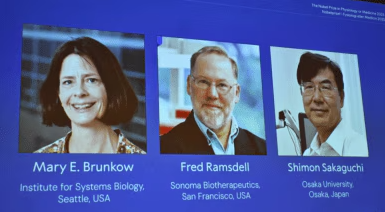US scientists Mary E. Brunkow and Fred Ramsdell, along with Japan’s Shimon Sakaguchi, have been awarded the 2025 Nobel Prize in Physiology or Medicine for their groundbreaking discovery on peripheral immune tolerance.
The scientists awarded the prize for discovering how the immune system protects us from thousands of different microbes trying to invade our bodies. Announced by the Nobel Committee today at a ceremony in Stockholm, Sweden, the trio were honoured for identifying regulatory T cells, key components that prevent the immune system from attacking the body’s own tissues. This discovery has paved the way for new treatments in autoimmune diseases, cancer, and organ transplantation.
The prize, worth 11 million Swedish kronor, will be shared equally among the three laureates. Brunkow and Ramsdell, based in the US, and Sakaguchi from Japan, made critical contributions that launched a new field in immunology. Their work is now influencing clinical trials and therapeutic strategies worldwide, with hopes of significantly improving patient outcomes in a range of immune-related conditions.
Born in 1961, Brunkow holds a doctorate from Princeton University in the US. He is currently the Senior Programme Manager at the Institute for Systems Biology in Seattle. Ramsdell was born in 1960 and undertook a Ph.D in 1987 from the University of California-Los Angeles, US. He is the Scientific Advisor at Sonoma Biotherapeutics in San Francisco.
Born in 1951, Sakaguchi studied M.D in 1976 and Ph.D. in 1983 from Kyoto University, Japan. He is currently the Distinguished Professor at the Immunology Frontier Research Center in Japan’s Osaka University.
The 2024 Nobel Prize in Physiology or Medicine was jointly awarded to American scientists Victor Ambros and Gary Ruvkun for the discovery of microRNA and its role in post-transcriptional gene regulation.








